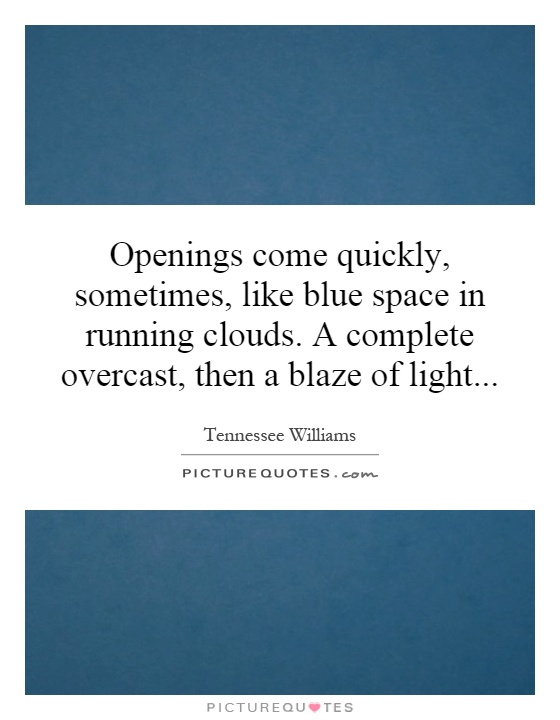Openings come quickly, sometimes, like blue space in running clouds. A complete overcast, then a blaze of light

Openings come quickly, sometimes, like blue space in running clouds. A complete overcast, then a blaze of light
Tennessee Williams, the renowned American playwright, was a master at capturing the complexities of human emotions and relationships in his works. His plays often delve into the darker aspects of life, exploring themes of desire, loneliness, and the struggle for connection. In many of his works, Williams portrays characters who are trapped in oppressive situations, yearning for a sense of freedom and release.The quote “Openings come quickly, sometimes, like blue space in running clouds. A complete overcast, then a blaze of light” perfectly encapsulates the essence of Williams’ writing. In his plays, moments of clarity and revelation often come unexpectedly, breaking through the darkness like a sudden burst of light. These openings can be fleeting, but they have the power to transform the characters’ lives in profound ways.
One of Williams’ most famous plays, “A Streetcar Named Desire,” exemplifies this theme of sudden openings and moments of illumination. The character of Blanche DuBois, a fading Southern belle, is haunted by her past and struggles to find a sense of belonging in a harsh and unforgiving world. Throughout the play, Blanche is trapped in a cycle of delusion and despair, unable to escape the ghosts of her past.
However, there are moments in the play where Blanche experiences brief glimpses of hope and clarity. These moments come unexpectedly, like a ray of light breaking through the darkness. For example, in the final scene of the play, Blanche has a moment of self-realization, where she confronts the harsh truth of her own actions and the consequences of her choices. This moment of clarity is both devastating and liberating, as Blanche finally faces the reality of her situation and the futility of her illusions.












 Friendship Quotes
Friendship Quotes Love Quotes
Love Quotes Life Quotes
Life Quotes Funny Quotes
Funny Quotes Motivational Quotes
Motivational Quotes Inspirational Quotes
Inspirational Quotes